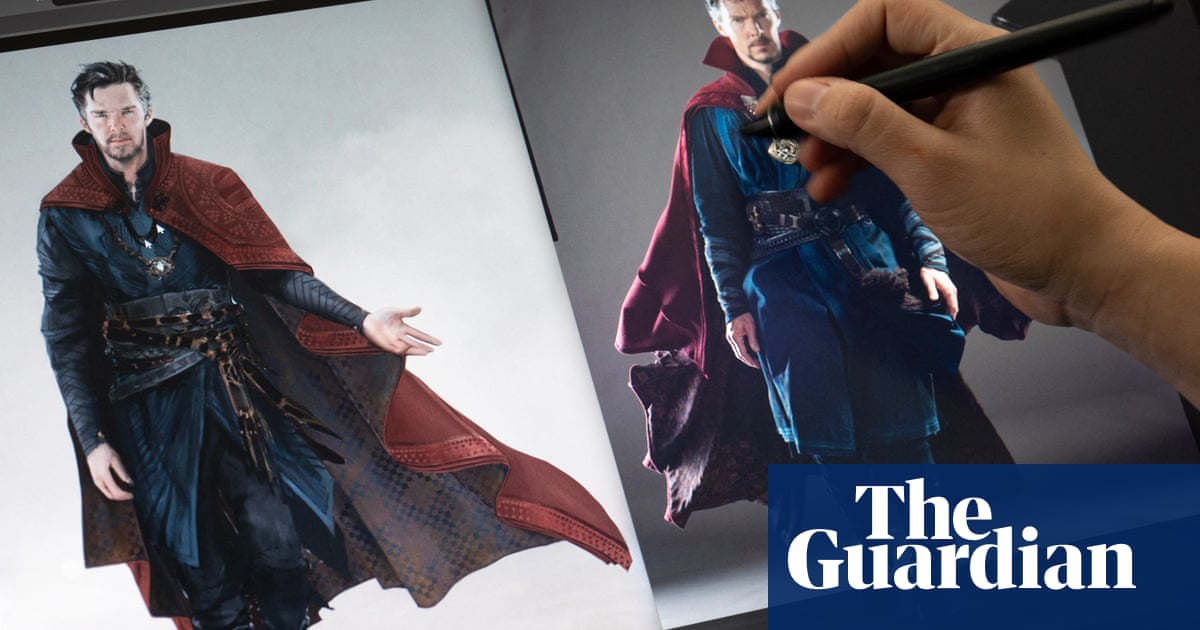â
But the impact goes beyond job losses. âBlowing up cars is really expensive,â says the VFX executive. âWouldnât it be great to have a system that does it better and faster?â
As I leave THU, I reflect on the words of Karla Ortiz, a concept artist in her 30s from Los Angeles who has worked on movies such as Doctor Strange and Star Wars: The Rise of Skywalker. âThis feels like identity theft,â she told me. âIâve spent years honing my craft, developing my style, establishing my voice. And now they can just push a button and replicate it with a machine that doesnât care about any of that. It feels like everything Iâve worked for is being taken away.â
The future is here, and itâs AI. But as the waves of technological change crash over the entertainment industry, who will be left standing? And at what cost?
The use of AI in the creative industries is causing tension and uncertainty among artists. Some feel like they are in an impossible position, where using AI could make them obsolete, but not using it could also have negative consequences. Artists like Karla Ortiz have taken a stand against AI companies, filing a lawsuit claiming that they violate the rights of artists by using their work without permission.
On the other hand, AI companies like Runway AI see their technology as a way to drive down production costs and make content creation more efficient. They believe that AI can free artists from tedious tasks and allow them to focus on more creative work. Despite concerns about job displacement, they argue that new opportunities will be created as a result of advancements in AI.
Ultimately, the debate over AI in the creative industries is complex and ongoing. Artists are grappling with how to navigate this new technology while also advocating for their rights and the integrity of their work. As the industry continues to evolve, the role of AI in creativity will undoubtedly shape the future of art and entertainment. Ilustración: openai.com/sora
Luis compara la inteligencia artificial generativa con la comida ultra procesada: no puede crear nada nuevo; solo puede reconstituir lo que ya está allí, convirtiéndolo en un producto inferior. “Y muchas empresas están tratando de hacer comida rápida”, dice. Muchos ven la IA como una forma de producir contenido rápido y barato, en lugar de un producto de mayor calidad que se ha creado “orgánicamente” con el tiempo, con el amoroso aporte humano.
Además de la demanda de Ortiz que potencialmente podría cortar el suministro, al público no le gusta el contenido generado por IA, y tampoco a los artistas que trabajan en estas industrias, muchos de los cuales se sienten como chefs entrenados obligados a hacer hamburguesas. “Hay muchas personas que están renunciando a estas empresas que intentan hacer comida rápida con IA”, dice Luis. “Están buscando sus propios caminos de una manera diferente, y creo que están en lo correcto”. Él ve a THU como parte de eso; más allá del festival, también es una plataforma durante todo el año para que los creativos se conecten y colaboren.
El potencial democratizador de la IA podría dar paso a lo que Luis llama “una nueva era indie” en películas, juegos, televisión. Así como la tecnología digital puso cámaras, herramientas de edición y gráficos en manos de muchas más personas. “La IA permitirá a muchos jóvenes que nunca tuvieron el presupuesto para implementar sus ideas, hacer cosas increíbles”, dice. “En lugar de tener miedo a la IA, muchos jóvenes creadores piensan, ‘Mis sueños ahora son posibles. No necesito $100 millones para hacer esto, puedo hacerlo con $2 millones’. En lugar de una organización con 500 empleados, tendrás 100 organizaciones con cinco empleados”. Como sucedió con el cine en los 90, “los grandes estudios comenzarán a comprar contenido de los indies”, predice Luis.
Esto podría no ser una buena noticia para las corporaciones de entretenimiento, pero podría ser una gran noticia para el público, los creadores y el arte mismo. Lo importante, dice Luis, no es el resultado final sino la cultura y el impacto que tiene en las personas, enriquecer la sociedad. “La IA es algo que está aquí”, les dice a los jóvenes creadores en THU, “así que necesitan adaptarse. Ver las oportunidades, ver los problemas, pero entender que puede ayudarte a hacer las cosas de una manera diferente. Deben preguntarse, ‘¿Cómo puedo ser parte de eso?'”
